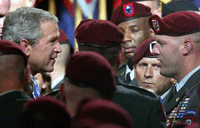George Bush at Fort Bragg: nothing new
Bush once again to persist the war on Iraq was justified

 Amid growing scepticism about the war on Iraq among the American public U.S. President George W. Bush tried to persuade Americans there is no possibility to withdraw U.S. troops from Iraq. Media in the United States as well as worldwide do not seem to be quite impressed by the speech. LA Times even called it a “major disappointment.”
Amid growing scepticism about the war on Iraq among the American public U.S. President George W. Bush tried to persuade Americans there is no possibility to withdraw U.S. troops from Iraq. Media in the United States as well as worldwide do not seem to be quite impressed by the speech. LA Times even called it a “major disappointment.”
In a nationally televised address before an audience of about 800 U.S. soldiers at Fort Bragg, North Carolina, last night, Bush said that U.S. progress in Iraq "has been uneven," but it "is being made."
The main point of Bush's speech at Fort Bragg was taken from his 2004 re-election campaign: the war in Iraq has an inseparable link with the 9/11 terrorist attacks, which inspired U.S. to start war on terrorism. As usual, Los Angeles Times noted, Bush failed to mention that the 9/11 commission found no credible evidence linking the former Iraqi government of Saddam Hussein and the 2001 terror attacks.
"This nation will not wait to be attacked again,'' Bush said in his address. ”The only way our enemies can succeed is if we forget the lessons of 9/11.''
The war in Iraq "demands the courage of our fighting men and women,'' Bush said, "and it demands the perseverance of our citizens.''
 As for the role of the Iraqi people in this battle, George Bush characterized it in a short and popular manner: "As the Iraqis stand up, we will stand down." Bush said the U.S. has trained more than 160,000 Iraqi personnel "for a variety of missions.'' The Pentagon plans to have about 275,000 trained by June 2006. Bloomberg cites Anthony Cordesman of the Washington-based Center for Strategic and International Studies, who says those numbers don't reflect how many can effectively replace the U.S. military.
As for the role of the Iraqi people in this battle, George Bush characterized it in a short and popular manner: "As the Iraqis stand up, we will stand down." Bush said the U.S. has trained more than 160,000 Iraqi personnel "for a variety of missions.'' The Pentagon plans to have about 275,000 trained by June 2006. Bloomberg cites Anthony Cordesman of the Washington-based Center for Strategic and International Studies, who says those numbers don't reflect how many can effectively replace the U.S. military.
As it is shown by AP, Iraqis really expressed a mix of feelings Wednesday when asked about George W. Bush's pledge to keep American troops in their country until Iraq's security forces can stand alone. Some of them do agree with the U.S. President, while others are fed up with what they still call an "occupation."
One of Iraqi citizens told AP, that "the transfer of authority was a great dream but nothing took place" after that. The problems faced by Iraqi people now caused by the presence of foreign troops, said the respondent.
Notably, George W. Bush mentioned al-Qaida leader Osama bin-Laden by name, which is quite unusual for the U.S. president, the BBC says. Bush even used a famous bin-Laden quotation: a "Third World War... is raging" in Iraq, and it will end in "victory and glory or misery and humiliation."
Analysts stress that Bush's appeal to the war in Iraq was made amid growing violence against U.S. military as well as Iraqi citizens. According to Bloomberg the death toll of U.S. military in Iraq reached at least 1,734, with the attacks made by the insurgents almost every day.
The killing of the oldest member of Iraqi parliament, Shiite Dhari Ali al-Fayadh, showed that the United States' attempt to establish democratic institutions (as the U.S. sees them) was not a success.
Bush also stressed that he opposed suggestions to set a timetable for withdrawing the U.S. troops from Iraq. He called such a timetable a "serious mistake'' that would send the wrong message to the Iraqis, U.S. allies, the American people and the enemy. Using his usual rhetoric U.S. President called the war in Iraq "vital'' to U.S. security.
Senate Democratic leader Harry Reid of Nevada stated that Democratic senators are ready to work with President Bush if he "acknowledges his mistakes and sets forth a realistic course for the future." Sen. Charles Schumer, New York, agrees with Reid, saying it is "not enough for the president to say 'stay the course' and make a few minor adjustments," because a concrete plan is needed.
Alan Lichman, professor of history at Washington's American University, acknowledged that Bush certainly was eloquent and effective but all this could be washed away as soon as the next tragedy in Iraq occurs," the BBC reports.
Independent pollster John Zogby, cited by Newsday, expressed his concern that the speech didn't give news-hungry viewers the answer on how Bush hopes to get out of Iraq.
Actually, there cannot be anything new to consider. In a situation when Bush's rating has become record low (Bush's activity as president is approved by 45 percent against 53 percent of those who disapprove, according to a recent poll) such a speech should be considered just as a try to improve one's image. And it should be noticed, the try was not a success.
Photos: AP
Subscribe to Pravda.Ru Telegram channel, Facebook, RSS!


